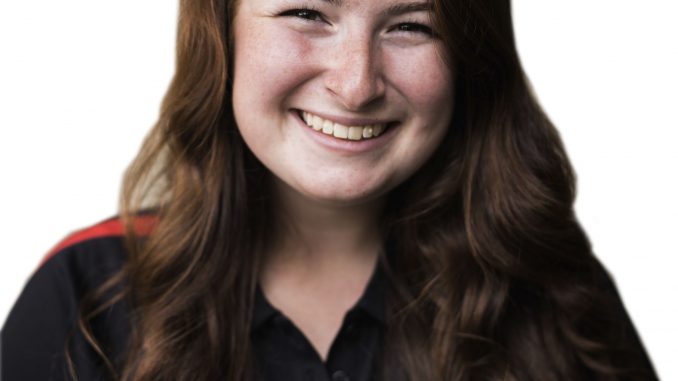
 Near the end of my political science class, students began putting away their belongings prematurely, like students often do. “Don’t pack up, we have a speaker!” my professor yelled over the sounds of ruffling papers and zipping backpacks.
Near the end of my political science class, students began putting away their belongings prematurely, like students often do. “Don’t pack up, we have a speaker!” my professor yelled over the sounds of ruffling papers and zipping backpacks.
A campaign staff member from Democratic presidential nominee Hillary Clinton’s campaign took over the classroom. She spoke proudly of Clinton and her platform. She discussed the success of the Democratic National Convention. She even showed a full powerpoint presentation quite similar to the stump speech Clinton gave to students last week in Mitten Hall.
As the staffer finished up, she asked for students to volunteer with the campaign and passed around postcards for students to sign, pledging their vote to Clinton.
As my professor began wrapping up class, my immediate thought was: “When will Donald Trump’s campaign staff or any other campaigns come in and speak with us?”
I consider most of my viewpoints to be liberal. But it’s wrong and even damaging for a professor not to be balanced in allowing campaign staffers into the classroom.
A lot of student opinions are formed in the classroom, as we learn more about the world around us. With a presidential race as important as this one for our generation, it’s important for students to see the full picture so they can make an educated decision on the candidate they want to vote for.
While professors aren’t required to be balanced, they should recognize their influence over students.
“On an introductory level, professors are the biggest factor other than upbringing,” said Austin Severns, Temple College Republicans chairman and junior supply-chain management major. “That’s why you see a lot of people change their political ideology when they leave home for the first time, particularly [at Temple].”
“Other than your parents and where you live, teachers have most of the influence,” he added.
Pat Amberg-Blyskal, a political science professor, has always avoided being partisan in the classroom.
Amberg-Blyskal worked for 30 years in public service at the federal level and had to abide by the Hatch Act of 1939, which prohibits most federal government employees from engaging in political activity at work.
“You never speak about political parties or candidates,” Amberg-Blyskal said. “You have to be extremely clear that there’s no partisan politics in the workplace.”
“That 30 years predispositioned me to my conduct in the classroom, so I strive to speak to critical thinking,” Amberg-Blyskal added.
Because it may be hard to get both sides of a political campaign to come and speak to classes, political science professor Conrad Weiler said many professors may not get involved with political campaigns at all.
“I think you are taking a risk, because then someone from the other side will hear about it,” Weiler said. “It is risky, it’s no question. You could appear on someone’s blog or on a list of ‘liberal professors.’ You do have to be careful.”
My political science professor told our class that Trump’s campaign staffers could come and speak to us if they wanted to do so. But it’s the fact that the two most prominent campaigns weren’t just automatically represented in our classroom that concerns me.
Before coming to Temple, students often haven’t been exposed to views outside of those represented in their communities. With access to this election’s political campaigns in the city, students should be able to hear from both of them.
“It’s impossible to not have values, to not be partisan,” Amberg-Blyskal said. “But regardless of those values, of those partisan inclinations, my thought process is that the critical, analytical thinking are important.”
Maybe it’s the journalist in me, but I’m going to continue to expect balance from professors. Students must be left to form their own opinions, or it will begin to damage the political process.
Gillian McGoldrick can be reached at gillian.mcgoldrick@temple.edu.


Be the first to comment